Author: Adara Development
It was a desire to make a difference that first put Pledge 1% on Ansarada Co-Founders’, Sam and Rachel Riley’s radar. And it was a transformative meeting with Adara Group Founder and Chair, Audette Exel AO, that led Ansarada to pledge 1% of their equity, time and product to Adara.
Ansarada is a global ASX-listed software as a service business that companies, advisors and governments rely on for securely managing critical information, workflow and collaboration in high stakes processes like deals, risk, compliance, governance and procurement. The Adara Group is an international development organisation delivering quality health and education services to people living in poverty in some of the world’s remotest places.
When Ansarada learnt of Adara’s life-changing work and their innovative business-for-purpose model (more on that here) it seemed like a meeting of minds and a natural alignment on purpose. It marked the beginning of a powerful partnership that is still going strong, ten years down the line.
This partnership has seen Ansarada staff give their time to set up technology platforms or provide marketing support as part of the 1% of time pledge. It’s seen Adara get access to Ansarada’s software thanks to the 1% of product pledge. And it has seen Adara become an Ansarada shareholder through the 1% of equity pledge.
Since the beginning of the partnership in 2015, both organisations have grown and evolved. But what’s held it all together?
“It goes back to the culture,” Rachel says. “As we have gone from start up to scale up, it’s culture that trumps all other strategic outcomes. And as you scale up, that culture can change based on the people you hire and the community around you. Culture is obviously influenced by the people and your growth journey. But the starting culture of a start-up business is arguably built by the values that the founder(s) have.”
The founders of Ansarada always knew they wanted to create impact beyond just their business. They built giving – and Adara specifically – into their culture, right from the very beginning.
“Adara hasn’t just fit into that culture, Adara has actually helped create that culture,” Rachel says. “If we did a survey today of everyone globally across the business, in terms of what philanthropic impacts they’re passionate about, they would say the disadvantaged, the women and children in poverty in remote places. That’s Adara. They’ve grabbed that passion, they’ve heard that story and they can see the impact of what they’re doing.”
By understanding the causes that would resonate with their staff and embedding it early, Ansarada built a powerful culture that has endured recruitment drives, capital raisings, ASX listings and stakeholder changes.
“In a million different ways, the culture of Ansarada and the culture of Adara have clicked really deep,” agrees Adara’s Founder, Audette Exel. “And I cannot emphasise enough how important culture is for a business – everything flows from there.”
It’s been a mutually beneficial partnership. And the decision to choose Adara as the sole beneficiary of Ansarada’s 1% pledge was conscious, according to Rachel.
“Having a foundational rock with a non-for-profit that you support really helps your business,” Rachel says. “Having the pillar that everyone is centred around, that’s where the deep impact comes from.”
This hasn’t stopped the Ansarada team from getting involved with other local volunteering opportunities. But it has meant they approach their corporate giving in a much more strategic and targeted way, with Adara at the centre, bringing it all together and creating a bigger impact.
Audette, a social entrepreneur in her own right, has one key piece of advice for any organisation looking to begin their Pledge 1% or social impact journey: “Do it early. Like really early. Do it quick. And then embed it. When you’re starting, 1% may be 1% of very little. Once you grow a business, if you’re lucky enough and if you’re able to build something to scale, the impact can be massive – as it has been for us at Adara.”
Rachel agrees. “Ansarada wouldn’t be what it is today without the Adara relationship,” she says. “But if these partnerships aren’t embedded early on, it’s a difficult story to tell stakeholders later down the line.”
The tangible impact of a 1% pledge became clear earlier this year when Adara sold their stake in Ansarada. This followed the announcement of the proposed sale of part of Ansarada’s business.
“We poured that money straight into saving lives,” Audette says.
For both Adara and Ansarada, the impact of this 1% of equity is more than you’d ever see on a balance sheet. It’s a baby opening its eyes in a hospital in rural Uganda, who otherwise might have died. It’s a 12-year-old girl in a school uniform, rather than a wedding dress. It’s a child who was pulled out of a basement on her way to the trafficking trade, graduating top of her class.
And that’s exactly what the Pledge % movement is all about. Using the power of business to create change. To save lives.
To be a force for good.
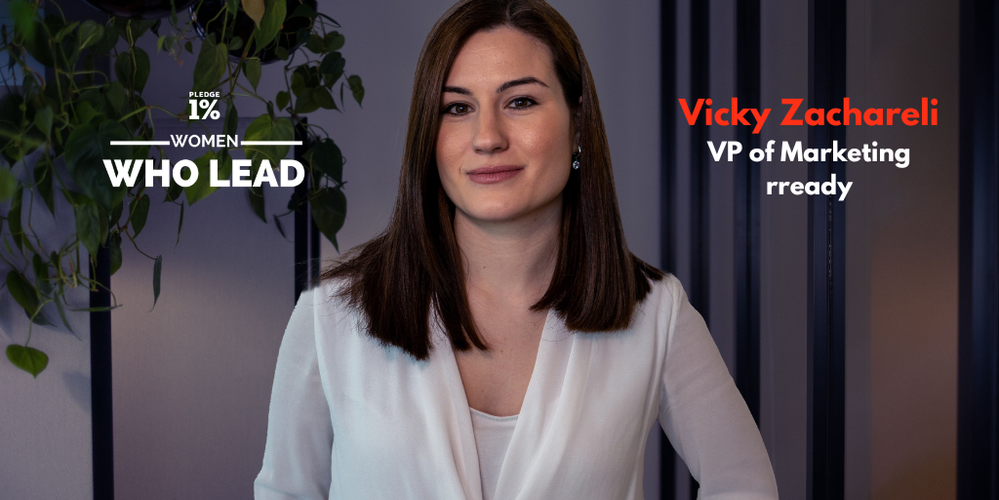
Vicky Zachareli
VP of Marketing, rready
Zurich, CH / Athens, GR
If you could describe yourself in one word, what would that be and why?
Fair. I may not always succeed, but I always aim for fairness. Since the world can be an unfair place, I believe we should all do our part to make it as fair as possible within our own reach.
Do you give back to the community with your team and work? If so, what does this look like?
rready continuously supports any opportunities to give that arise. We have supported several different communities’ initiatives from students in Switzerland to entrepreneurs in Namibia.
Me personally I am a volunteer mentor for women who want to evolve professionally or change career paths.
What’s the best piece of advice you’ve ever received?
How you start things off matters.
What advice do you have for women who are just starting their career?
It’s not going to be easy, what matters is to get up after every fall and keep going. And don’t forget to take care of yourself on the way.
“Don’t forget to take care of yourself on the way.”
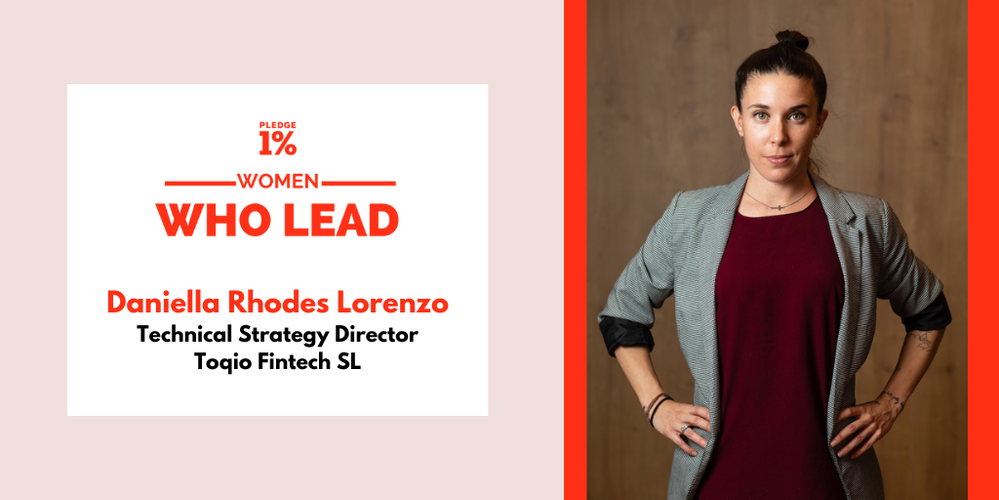
Daniella Rhodes Lorenzo
Technical Strategy Director, Toqio Fintech SL
Madrid, Spain
If you could describe yourself in one word, what would that be and why?
If I could describe myself in one word, it would be “trailblazer.” I’ve always been driven by a relentless passion for pushing boundaries and paving new paths in the world of technology. Whether it’s architecting innovative solutions or leading teams to exceed expectations, I thrive on challenging the status quo and charting a course toward excellence. Being a trailblazer means embracing change, seizing opportunities, and inspiring others to join me in the best way I can.
Pledge 1% provides a framework for businesses to do good. Do you think it’s important for today’s corporate leaders to prioritize social impact? If so, why?
Absolutely, businesses play a significant role in shaping society and influencing positive change. By prioritizing social impact, corporate leaders not only contribute to the greater good but also foster a culture of responsibility and sustainability within their organizations.
By proactively addressing social impact issues, businesses can help create a more stable and equitable society, which benefits everyone in the long run, also it can can increase employee engagement, morale, and loyalty, ultimately leading to higher retention rates and a more motivated workforce which nowadays is very difficult to create.
Do you give back to the community with your team and work? If so, what does this look like?
Giving back to the community is a fundamental aspect of both my personal values and the culture we cultivate within our teams and work environment. I am personally part of two organizations that contribute to help children in need, provide them with access to education, and healthcare delivery.
When it comes to business, we work as a team to start initiatives such as running or walking to donate to children in need, we do several activities that involve the whole company to contribute to schooling and rare disease investigations.
What’s the best piece of advice you’ve ever received?
Don’t think everyone thinks like you do, be patient, listen to what others have to say and don’t give the solution to a problem straight away, let others work on their knowledge and skills to reach an answer. If needed to help them reaching an answer, help them work to it and they will finally learn to work out issues without your help.
“Don’t think everyone thinks like you do, be patient, listen to what others have to say and don’t give the solution to a problem straight away, let others work on their knowledge and skills to reach an answer.”
This year’s International Women’s Day themes are focused on investing in women and inspiring inclusion. What can we do to make today’s workplaces more equitable and inclusive for women?
Creating more equitable and inclusive workplaces for women requires intentional and proactive efforts across various aspects of organizational culture and structure so the most important thing is to foster this culture across the whole business and make sure everyone is aware of this.
Two ideas would be:
1. Fostering a culture of flexibility and work/life balance, recognizing that women often bear a disproportionate amount of caregiving responsibilities, organizations can promote flexibility and work/life balance initiatives that accommodate diverse needs and lifestyles. This can include offering remote work options, flexible scheduling, and paid parental leave policies that support both men and women in balancing their professional and personal responsibilities.
2. Investing in leadership development and training. To cultivate a pipeline of female leaders, organizations can invest in leadership development and training programs specifically tailored to women’s needs and aspirations. This may include things such as executive coaching to help women overcome barriers to advancement and build confidence in their leadership abilities. Every time the number of women in leadership positions grow but it’s still difficult to find mentors who a women and that can help you have that confidence or have a “look up to” person.
What are you looking forward to this year? Are there any goals (personal or professional), activities, or experiences you are excited about?
The most exciting thing about this year is that I am going to be a mother for the second time and I am scared but thrilled at the same time. We live in a city where we have no family at all and my partner works in a different country so needs to fly a lot so this is going to be very interesting to fight for.
On a professional level we’re in a very powerful moment where we’re transitioning to a new architectural design and it’s a difficult transition because it requires a lot of changes and improvements not only in a technical level but also in the way of working; but at the same time it’s very exciting to envision what our platform is going to look like and the strength and work that’s behind it.
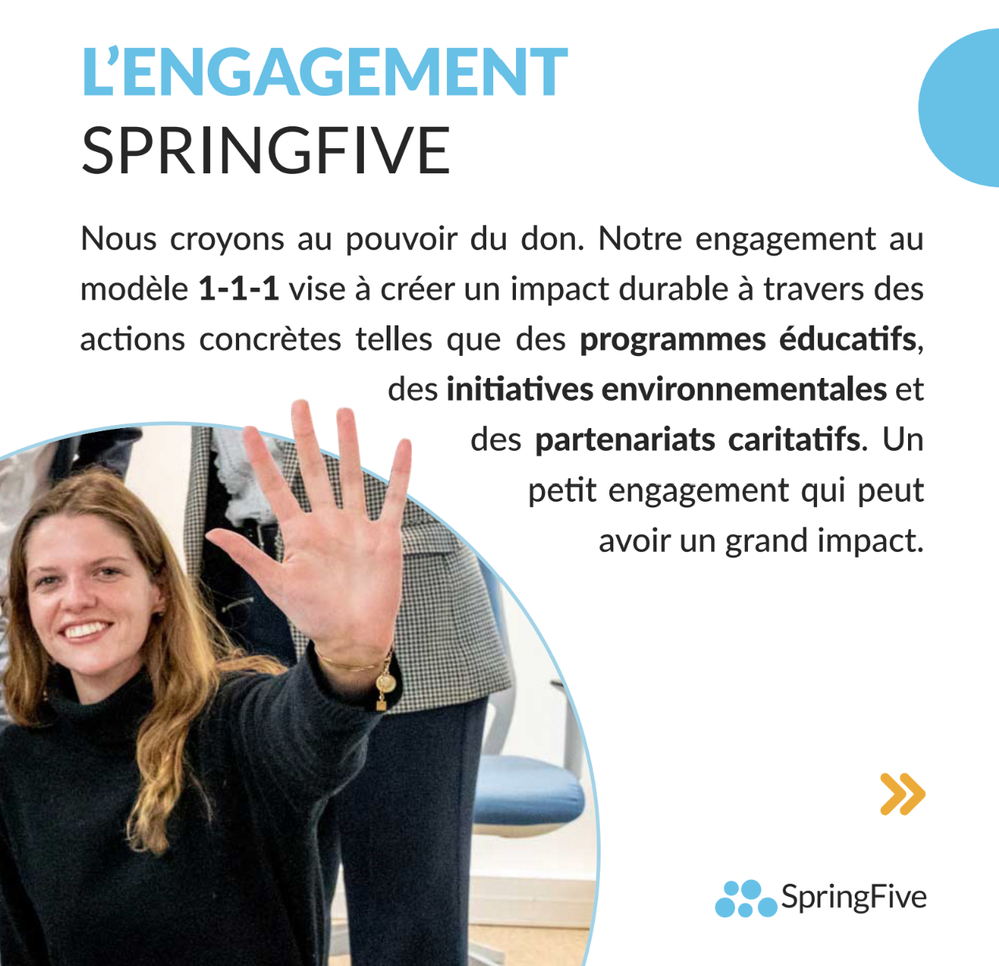
Author: SpringFive
Pledge 1% member SpringFive shares how its team is having an impact by donating 1% of equity, team time, and product via Pledge 1%. Read their Impact Report HERE for more.
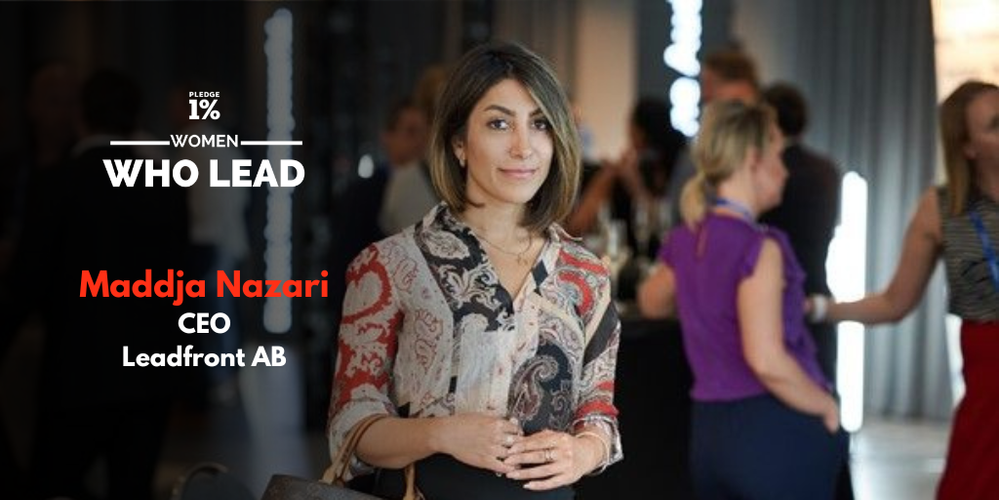
Maddja Nazari
CEO, Leadfront AB
Stockholm, Sweden
If you could describe yourself in one word, what would that be and why?
Determined; I believe that there is nothing in world that can not be achieved if one is willing to work hard, stay focused, and persevere relentlessly towards their goals.
Twelve years ago, I moved to Sweden without any relatives in the country, in order pursue my master’s education. At that time, not knowing the language, and countries regulation made starting a company seem like a difficult goal to achieve. However, I was determined to start my first company before turning 30, and everything I did was a step towards this objective. Four years later, just a month before my 30th birthday, I founded Leadfront.
Pledge 1% provides a framework for businesses to do good. Do you think it’s important for today’s corporate leaders to prioritize social impact? If so, why?
In today’s world, consumers are becoming more conscious. They’re not just looking for great products or services; they’re also interested in supporting companies that are making a positive impact on society. Corporate leaders who prioritize social impact are not only meeting this growing consumer demand but also differentiating their brand in a crowded marketplace. By aligning the business goals with initiatives that benefit society, leaders can generate goodwill, build trust with customers, and foster long-term loyalty.
Do you give back to the community with your team and work? If so, what does this look like?
Over a year ago, we introduced Streamstone, a new company focused on supporting NGOs and member organizations in their digitalization endeavors. By improving these organizations’ communication with their members, we ensure they become more efficient and effective in accomplishing their objectives. Additionally, we allocate 1% of Leadfront’s resources to delivering pro bono projects for NGOs.
What’s the best piece of advice you’ve ever received?
Be the change you wish to see in the world.
This year’s International Women’s Day themes are focused on investing in women and inspiring inclusion. What can we do to make today’s workplaces more equitable and inclusive for women?
Leaders should start by implementing policies and practices that promote gender equality at all levels of the organization. This includes actively recruiting and promoting women into leadership positions, ensuring pay equity, providing mentorship and development opportunities and fostering a culture of respect and support.
There are other things such as offering flexible work arrangements, parental leave policies, and childcare support which can help address the unique challenges faced by women in balancing work and family responsibilities.
At Leadfront, we actively strive to create an equal and inclusive work environment, and this is reflected in our recruitment strategies to attract more women to our team. Recruiting women in a technical and traditionally male-dominated industry has its challenges, but we have actively worked to overcome these obstacles. By offering a work environment where equality and inclusion are a high priority, we have created a place where women feel welcome.
Our experience has shown that prejudices that women would not be interested in or fit into technical roles are incorrect and outdated. We are proud to have shattered these preconceived notions and instead to have built a diversified workforce where everyone feels represented and where every individual, regardless of gender, is given equal opportunities to flourish and contribute to our common goals.
What advice do you have for women who are just starting their career?
- Select a company whose values align with yours.
- Value a company with culture of respect and support that provides same opportunities regardless of gender.
- Embrace every opportunity for personal and professional development.
- Be confident in voicing your opinions and advocating for yourself.
- Have faith in your abilities to achieve success, recognizing the importance of persistence and determination.
“Stay resilient and focused on your long-term goals”
What are you looking forward to this year? Are there any goals (personal or professional), activities, or experiences you are excited about?
I am excited about assisting NGOs in optimizing their operations through digitalization, which will not only streamline processes and improve communication with members but also enable them to fulfill their mission more efficiently.
Additionally, I eagerly anticipate witnessing how leaders harness cutting-edge technologies like AI to create people-centric organizations that meet the evolving needs of their communities.
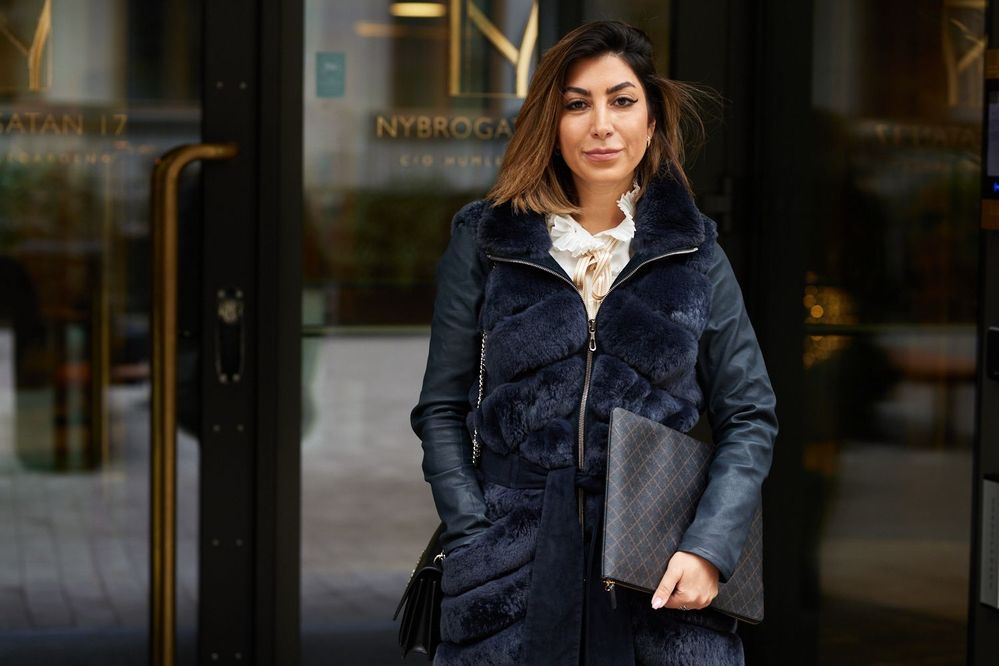
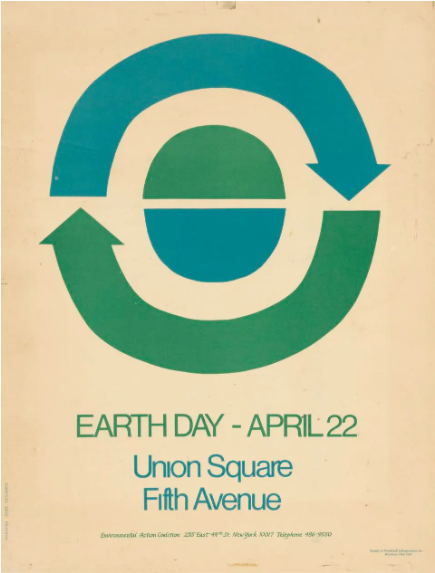
Original article here
Author: Alexander Puutio
Earth Day is upon us.
Since its inception in the 1970s, April 22nd has provided an apt opportunity for companies and their leaders to reflect on their impact on our shared planet and to take action to safeguard its future.
If you are still looking for a way of getting involved, you’re bound to find an initiative that fits your sustainability strategy.
For example, the EARTHDAY.ORG is rallying its forces around the theme of Planet vs. Plastics, seeking a 60% reduction in plastic production by 2024. The World Wildlife Fund offers guidance for companies looking to get started by giving them tangible starting points from 60 Actions for the Planet to dedicating an hour to serving earth. Elsewhere, a number of organizations are focusing on sustainable mobility with Earth Day Canada calling for a leg day and NYC is holding its biggest Open Streets ever.
If these initiatives aren’t enough, you can find hundreds of local events, ranging from cleanup projects to Earth Day Festivals registered on EARTHDAY.ORG’s event tracker. Clearly the global sustainability movement is finding its groove.
The same can also be said about corporate giving and sustainability efforts that go well beyond Earth Day. In fact, initiatives like the Pledge 1% are guiding millions of dollars into catalyzing climate action directly from corporate coffers.
For those who are seeking a way to commit to our planet for more than the going 24 hours, read below for an intro to how Salesforce and Atlassian have driven positive change by pledging 1% of their equity, time, product or profit.
How The Pledge 1% Works
Pledge 1% was established in 2014 by Salesforce, Atlassian and Rally. The initiative was built around Salesforce’s 1-1-1 model which began already in 1999, driven largely by a growing demand for peer guidance on how to navigate corporate philanthropy.
What began as a small initiative has grown into a movement with more than 18,000 members across the globe. Pledging is easy, and it comes with an active support framework with its own pledger community and a wealth of resources that will help you get started.
What sets the Pledge 1% apart is its inherent flexibility. Companies of any size and industry can join, and they can steer their philanthropic efforts towards goals that matter most to them. Today, a growing number of these goals are tied to environmental sustainability.
One company that is intentionally steering more funding into catalytic grants on behalf of the planet is Salesforce.
How Salesforce Deploys Their 1% On Behalf of The Planet
As a founding member of the Pledge 1%, Salesforce is walking the talk.
To date, Salesforce employees have dedicated 8.7 million volunteer hours, and the organization has doled out more than $700 million in grants, which includes a $100 million commitment by decade’s end dedicated to climate action.
In our recent chat with Naomi Morenzoni, SVP Climate and Innovation Philanthropy, she noted that these figures wouldn’t be possible if the pledge was anything else than a sincere commitment to positive impact.
“Our leadership understands that business is the greatest platform for change and that we have a unique opportunity to do good by doing good business,” Naomi explained as we discussed how Marc Benioff and the senior leadership team has built the 1% model deep into the firm’s DNA.
Even though the share of corporate giving trails behind individual charity, corporate philanthropic capital can be transformative when deployed tactically. “When considering where to engage and how, we look closely at where our funds could bring about an outsized impact. We look for opportunities to catalyze, even if it means having to be more patient, which is something philanthropic funding excels at,” Naomi added.
If your company is just getting started with its philanthropic programming, here’s our discussion concluded on three guiding principles that are good to keep in mind; listen deeply and intently to the grant recipient and their communities, go for smart philanthropy that works together instead of in silos, and embrace unrestricted funding even when it comes with less control over the outcomes.
“Corporate philanthropy has to be more risk tolerant if we are going to reach our global climate goals. Corporate philanthropists should be more like angel investors and comfortable that not every investment will be a breakout success.,” Naomi reflected on the narrative and hit rate that companies embarking on corporate giving missions should adopt.
What Matters From The Recipient’s Perspective
One grant recipient that is showing early signs of being a break-out success is RE-volv, a energy justice nonprofit that provides solar financing to community-based nonprofits across the country. RE-volv received an $850,000 grant from Salesforce to support underserved communities in accelerating access to solar energy.
In our chat with RE-volv’s Executive Director, Andreas Karelas, we discussed the recipient’s viewpoint at length.
“Our model is made possible by external funding, and we see first hand the impact corporate philanthropy has as it enables us to help our client nonprofits go solar and raise awareness about clean energy in their communities,” Andreas explained.
RE-volv has received funding from Wells Fargo, Salesforce, the Kresge Foundation and The Schmidt Family Foundation, among others, who have given unrestricted grants or operational capacity building grants that allow RE-volv to direct the funds to where they are needed the most.
“We’re thankful for the trust and support our funders have shown us, and quite frankly the impact we seek to deliver wouldn’t be possible at the scale and pace we want to see if we hadn’t been given funding for general support,” Andreas explained.
While every grant recipient is different, there are key considerations that you should keep in mind as you build and expand your corporate philanthropy programs.
First and foremost, make sure to take the time to understand the needs and objectives of the organizations. Lean on a partnership approach, rather than a purely transactional relationship, in order to foster deeper alignment and to build trust which is perhaps the most important ingredient in the mix.
Secondly, recall the importance of flexibility. Grant recipients like RE-volv are able to respond dynamically to the landscape they see unfolding in front of them thanks to the lack of restrictions, making it possible for them to maximize the effectiveness of every dollar donated.
Lastly, remember that patience and a long-term view are essential. In the end, true change, especially in areas as complex and vast as climate action, takes time and persistence.
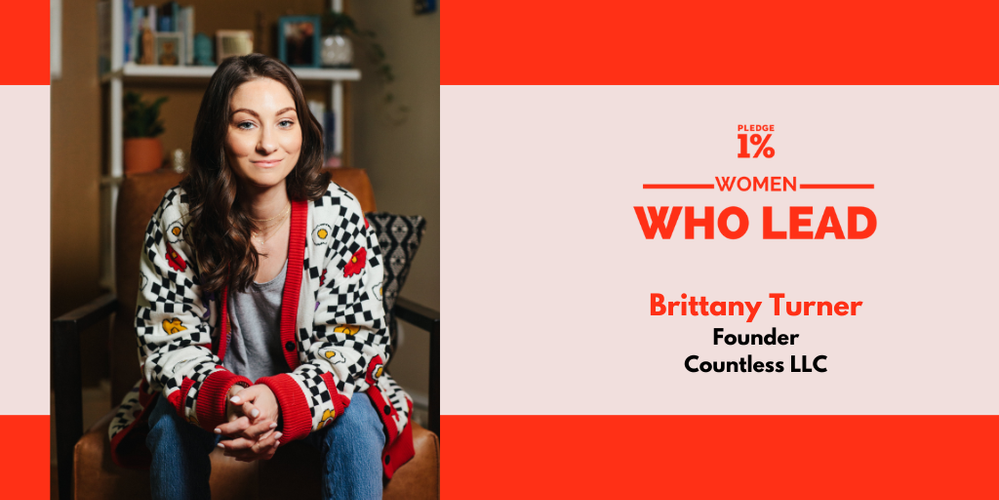
Brittany Turner
Founder, Countless LLC
Philly, US
If you could describe yourself in one word, what would that be and why?
Resilient. I’ve faced a number of difficulties in my life, from a very young age, and I’ve never given up, lost hope, or become hardened. I have a mindset that truly believes life gets better each day and the best is yet to come.
Pledge 1% provides a framework for businesses to do good. Do you think it’s important for today’s corporate leaders to prioritize social impact? If so, why?
Absolutely. Businesses make up a large percentage of our global population and if businesses are not prioritizing social impact in the same way that individuals are, we’ll always fall short.
Do you give back to the community with your team and work? If so, what does this look like?
Yes. Even before taking the pledge with Pledge 1%, I’ve donated at least 1% of our gross proceeds to charity since starting Countless in 2016. That approach was rooted in my personal life where I’ve been an advocate for giving back to the community since my early college days.
What’s the best piece of advice you’ve ever received?
Probably from my father – he really drilled it into my head from a young age that I could do anything, be anything, and that it was so important for me to be entirely self-sufficient. I never felt like anything was out of reach for me. He helped make me fearless in my career.
What advice do you have for women who are just starting their career?
You can do anything and be anything. And don’t wait to opt-in to your company’s 401k. Compound interest is no joke!
If you’re at a company that doesn’t offer a 401k, encourage them to offer something or look for another position. It doesn’t require much for a company to offer this to their team and if they don’t, they might not prioritize your whole being.
“You can do anything and be anything.”
What are you looking forward to this year? Are there any goals (personal or professional), activities, or experiences you are excited about?
Yes! Personally, I am going on a 6-day hike in the Andes mountains this summer that I’m very much looking forward to!
Professionally I am excited about working with more clients in a financial planning capacity. I received my CFP® license in December of 2023.
 Original article here
Original article here
Author: Eddie Pells
NEW YORK (AP) — American Olympic athletes have a new place to turn to lock down college degrees and other skills for life after sports thanks to a partnership U.S. Olympic leaders announced Tuesday with the Denver-based education company Guild.
The deal between Guild, organizers of the 2028 Los Angeles Olympics and the U.S. Olympic and Paralympic Committee is designed to help the Olympic organizations fulfill commitments to help athletes begin the next chapters of their lives after retirement.
Guild says it has more than 250 offerings on its online platform for U.S. athletes, including opportunities for undergraduate and graduate programs, certification programs and career counseling.
“You’d be hard-pressed to think that someone’s going to go in there and not find something that works for them,” said Carrie White, the USOPC’s vice president of athlete development and engagement.
White said in a recent survey of 5,000 Olympic and Paralympic alumni, around 60% of athletes who were 39 and younger said they needed help with career and professional development. She said within days of the program’s launch earlier this month, some 95 athletes had created profiles on the platform.
Guild CEO Bijal Shah said that because Olympic and Paralympic athletes spend most of their time early in life focusing on sports, they sometimes enter the workforce in need of skills for new careers that others in the job market have already acquired.
“We thought that their capabilities and the services Guild provides could be an amazing opportunity for those athletes,” Shah said.
Shah said Guild was formed in 2015 to offer solutions to the reality that “there was a problem in this country around the student-debt crisis,” along with the overall cost of post-graduate studies, that often stymied people’s quest for degrees and other adult education.
Guild works with employers — Walmart, Chipotle and Target are among its big-name clients — that offer programs for their workers through the company’s platform that helps them further their educations, tuition-free.
Shah said people who embark on Guild are 2.6 times more likely to move up in their company and that incremental wage increases earned by Guild learners are around two times larger than for those who don’t participate.
Jess Bartley, who heads the USOPC’s psychological services department, said post-retirement planning is one of the most consistently difficult conversations to start up with athletes. It’s another example of how this deal fits into what the USOPC and LA28 are trying to accomplish in an era in which they are increasingly being pressed to consider athletes’ overall well-being, and not just how they perform inside the lines.
Janet Evans, the four-time gold-medalist swimmer who serves as LA28’s chief athlete officer, said “Guild’s vision … aligns with LA28’s commitment to supporting the whole athlete, from their performance to their total well-being.”
White said the USOPC awarded more than $1.8 million in tuition grants in 2023 to qualified athletes, most worth around $4,500 that were paid directly to the schools they attended.
Those grants will continue, while the partnership with Guild offers a different option and, White said, more benefit because many programs are fully funded. For programs that are partially funded through Guild, the USOPC will cover up to $10,000 a year. Athletes who qualify will be eligible to use Guild for up to 10 years after they retire.
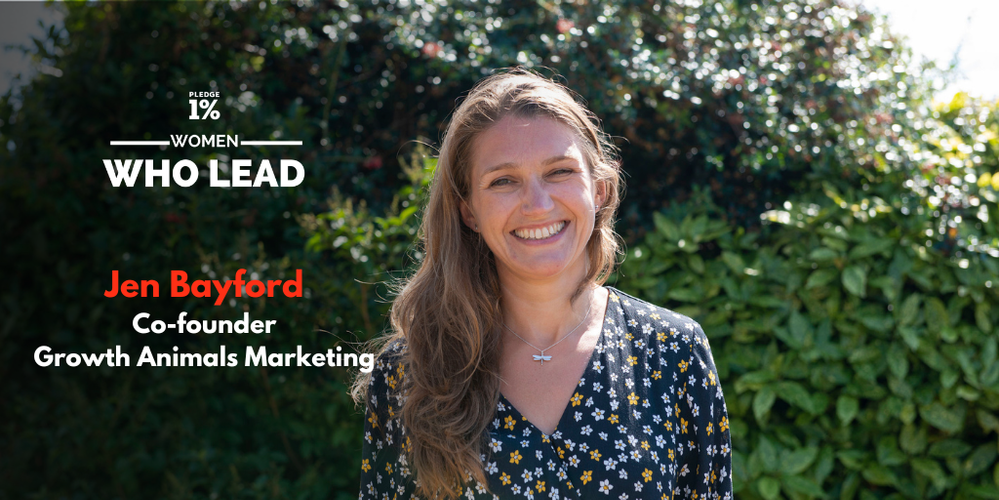
Jen Bayford
Co-founder, Growth Animals Marketing | B Corp Certified
West Sussex, UK
If you could describe yourself in one word, what would that be and why?
Best-friend (or is that two words?!) – we are often described by our clients as their best friends, allies and confidents, for example, at one client, the marketing manager, said “Working with Jen is invaluable and an absolute pleasure. Jen works with you to agree a solid strategy and provides unwavering support. She genuinely feels like a member of the team!”
Pledge 1% provides a framework for businesses to do good. Do you think it’s important for today’s corporate leaders to prioritize social impact? If so, why?
100% as environmental and social impact are becoming hygiene factors as customers are becoming more and more discerning as to the brands they align with
Do you give back to the community with your team and work? If so, what does this look like?
Yes we do – our main ‘giving back’ activity is we volunteer regularly. For example, instead of throwing a birthday party for Growth Animals last year, the team spent the day volunteering for Together Co., a loneliness charity based in Sussex, spending quality time with the people in the community they support. And we frequently take on pro-bono projects for causes, where an organization would benefit from our marketing strategy workshop – a fun, time efficient way of adding real value to charities and not-for-profits and a chance for our team to all be involved and get the creativity flowing.
Last year we ran a pro-bono workshop and a short, follow-up brand project for a charity called The Sweater Project, that generates income for families in Afghanistan and helps the poorest children to survive.
What’s the best piece of advice you’ve ever received?
In her book The Source, Dr Tara Swart quoted Henry Ford “Whether you think you can, or you think you can’t–you’re right.” which has stuck with me.
I’m careful what I tell myself, as my brain is listening!
“Whether you think you can, or you think you can’t–you’re right.”
This year’s International Women’s Day themes are focused on investing in women and inspiring inclusion. What can we do to make today’s workplaces more equitable and inclusive for women?
OMG don’t get me started. The cost of childcare is beyond ridiculous, and although the responsibility of childcare more commonly falls onto women, we know this isn’t exclusively a gender specific issue, so organizations must be flexible with their working practices for all – it grates on me when those ‘at the top’ with nannies or no parental responsibility make the calls as to the WFH or flexible working policies and it’s so archaic. There are millions of bloody talented people out there who would be adding so much value to organizations if only they were treated as grown ups and given flexibility to work and parent, not choose between the two.
What advice do you have for women who are just starting their career?
My personal experience of my early career, that unfortunately shaped me until only the last few years, was that I was a ‘Stepford brand manager’. I tried to fit into a mold, to please, to follow the line, to do as I was told and I took on, what in retrospect was, subjective feedback. I wasn’t aware of my strengths to dial up, I just bent myself out of shape, dulling down my creativity, my confidence to ‘fit’ and do things as they’d always been done.
At Growth Animals, we want our team, at all levels, to challenge us and each other in order to bring fresh perspectives and to grow, learn and improve together. This ability, together with resourcefulness, is how we hire!
What are you looking forward to this year? Are there any goals (personal or professional), activities, or experiences you are excited about?
Having proudly achieved B Corp certification last year, we are excited to continue to grow our environmental and social impact through our business and the work we do with clients. We will continue to underpin the plans we craft, the brands we build and the growth we deliver for our customers with our responsible and sustainable marketing values.
A personal development goal for me for 2024 include studying Sustainable Marketing through the Chartered Institute of Marketing. And in my plans this year is to share our bread and butter experience of marketing and brand strategy with more client side marketers. So I will releasing bite-sized marketing strategy content to inspire in-house marketers to think strategically about their marketing efforts, and Chris and I are taking Growth Animals on tour, attending events around the country to pass on our knowledge and experience to the marketing industry.
